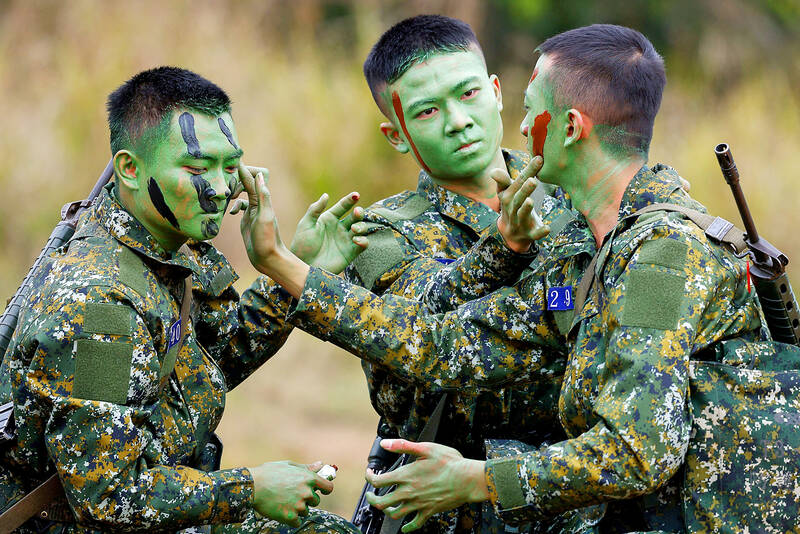The armed forces are at 80 percent strength, the Ministry of National Defense said in a report submitted to the legislature as part of the annual budget review.
The report did not include troops enlisted through the one-year compulsory military service that was reinstated earlier this year.
The military’s staffing level was 89 percent in 2020, 88 percent in 2021, and 80 percent in 2022 and last year, it said.

Photo: Ann Wang, Reuters
Taiwan’s declining population, the COVID-19 pandemic, competition from the civilian sector and inadequate salaries and perks offered by the military are to blame for the ministry’s recruitment woes, the report said.
Citing Ministry of the Interior data, the report said the pool of Taiwanese men who could potentially serve in the military last year decreased to 97,828, down from 102,740 in 2022.
The situation is expected to worsen with Taiwan’s 2031 military staffing pool dropping to a projected 74,036, it said.
The report revealed a worrisome decline, lawmakers reviewing the defense budget told defense officials during a question-and-answer session.
Some combat units are at less than 80 percent of their required strength and last year’s 78 percent retention rate was just above the government’s target of 76 percent, the lawmakers said.
The reintroduction of mandatory service would help provide troops for defense, but not combat units, which need seasoned professionals with skills acquired over years of training, the lawmakers said.
The defense ministry is urged to step up its recruitment efforts by reviewing its current methods, while paying particular attention to increasing the number of volunteer soldiers and boosting retention, they said.
Ministerial departments would provide the legislature with more written reports on these matters, they added.

Taiwan is to commence mass production of the Tien Kung (天弓, “Sky Bow”) III, IV and V missiles by the second quarter of this year if the legislature approves the government’s NT$1.25 trillion (US$39.78 billion) special defense budget, an official said yesterday. Commenting on condition of anonymity, a defense official with knowledge of the matter said that the advanced systems are expected to provide crucial capabilities against ballistic and cruise missiles for the proposed “T-Dome,” an advanced, multi-layered air defense network. The Tien Kung III is an air defense missile with a maximum interception altitude of 35km. The Tien Kung IV and V

The disruption of 941 flights in and out of Taiwan due to China’s large-scale military exercises was no accident, but rather the result of a “quasi-blockade” used to simulate creating the air and sea routes needed for an amphibious landing, a military expert said. The disruptions occurred on Tuesday and lasted about 10 hours as China conducted live-fire drills in the Taiwan Strait. The Civil Aviation Administration (CAA) said the exercises affected 857 international flights and 84 domestic flights, affecting more than 100,000 travelers. Su Tzu-yun (蘇紫雲), a research fellow at the government-sponsored Institute for National Defense and Security Research, said the air

Taiwan lacks effective and cost-efficient armaments to intercept rockets, making the planned “T-Dome” interception system necessary, two experts said on Tuesday. The concerns were raised after China’s military fired two waves of rockets during live-fire drills around Taiwan on Tuesday, part of two-day exercises code-named “Justice Mission 2025.” The first wave involved 17 rockets launched at 9am from Pingtan in China’s Fujian Province, according to Lieutenant General Hsieh Jih-sheng (謝日升) of the Office of the Deputy Chief of the General Staff for Intelligence at the Ministry of National Defense. Those rockets landed 70 nautical miles (129.6km) northeast of Keelung without flying over Taiwan,

A strong continental cold air mass is to bring pollutants to Taiwan from tomorrow, the Ministry of Environment said today, as it issued an “orange” air quality alert for most of the country. All of Taiwan except for Hualien and Taitung counties is to be under an “orange” air quality alert tomorrow, indicating air quality that is unhealthy for sensitive groups. In China, areas from Shandong to Shanghai have been enveloped in haze since Saturday, the ministry said in a news release. Yesterday, hourly concentrations of PM2.5 in these areas ranged from 65 to 160 micrograms per cubic meter (mg/m³), and pollutants were